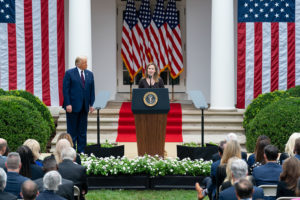It’s True, Dogma Lives Loudly within Judge Barrett
 Judge Amy Coney Barrett's nomintion ceremony at the White House on Sept. 26, 2020 (Official White House Photo by Andrea Hanks)
Judge Amy Coney Barrett's nomintion ceremony at the White House on Sept. 26, 2020 (Official White House Photo by Andrea Hanks) Donald Trump is pushing the separation of church and state to the brink with his nomination of crusading Christian nationalist Judge Amy Coney Barrett as late Justice Ruth Bader Ginsburg’s replacement.
As the executive director of the American Humanist Association—an advocacy organization that has defended the principle of church-state separation since its founding over seventy-five years ago—and unlike most politicians, pundits, and paid commentators, I know firsthand how adversely undermining a Supreme Court Justice Barrett would be to the wall of separation between religion and government.
In a letter to the Danbury Baptist Association in 1802, Thomas Jefferson most aptly synthesizes the vital importance of this principle. He writes, “I contemplate with sovereign reverence that act of the whole American people which declared that their legislature should ‘make no law respecting an establishment of religion, or prohibiting the free exercise thereof,’ thus building a wall of separation between Church & State.”
Like Judge Barrett, President Jefferson was no stranger to religion, but unlike her, he understood that upholding the law comes before personal beliefs. Moreover, as many reports in addition to Barrett’s own writings and associations indicate, the self-described “faithful Catholic” has a strong aversion to legal precedence—and perhaps more importantly, a deep-seated opposition to abortion, LGBTQ+ rights, the Affordable Care Act, and other matters that impact people’s basic liberties.
And while one cannot say for sure that Judge Barrett subscribes to an emerging school of thought that uses Christianity as a coating for exclusionary, white nationalist ideas, some of her religious affiliations and commitments clearly suggest she does.
As a humanist and nontheist who believes in a pluralistic society that respects the freedom of and from religion, I have no interest in the particularities of Judge Barrett’s faith, and, quite frankly, neither should you. What should be of grave concern to all Americans is whether she is willing and capable of setting aside the “dogma” that Senator Dianne Feinstein (D-CA) notably said “lives loudly within [her]” during her nomination hearing for the Seventh Circuit Court of Appeals in 2017.
If I could reasonably say that, like Justice Ruth Bader Ginsburg, Judge Barrett would approach all Supreme Court cases that come before her—even those at great odds with her Catholic faith—with the even-handedness and open-mindedness that is required of jurists (and especially those who sit on the bench of the highest court of the land), then I wouldn’t be writing this.
Instead, the deeply troubling commencement speech Judge Barrett delivered to graduating law school students in 2016, where she plainly told them their “legal career is but a means to an end, and…that end is building the kingdom of God,” must be considered in judging her perception of the law and her ability to distinguish between her personal creed and the US Constitution.
But I know—and you know—that were she capable of that distinction, the conservative Christian nationalist movement would not be enamored with her. In fact, it appears her views of the law as a means for evangelizing fuels her antagonism towards the separation of church and state, assiduously reported here, which, in turn, informs her vision of a government that is not only intertwined with conservative Christianity but also has the license to instruct Americans on how to live according to her religious beliefs.
It’s clear how Judge Barrett’s fundamentalism has tainted her judicial philosophy since joining the appeals court, even to the detriment of public health and safety, as exemplified by her joining a decision of the Seventh Circuit granting an exemption to churches and other religious gatherings from a state-mandated, in-person assembly cap. The result of this decision no doubt contributed to the coronavirus death toll, which has claimed over 200,000 American lives. Barret wishes to privilege religion over all else.
On the other hand, in sharp contrast to her presumptive replacement, Justice Ginsburg argued in a dissenting opinion in American Legion v. American Humanist Association that a religious display doesn’t lose its religious symbolism over time. Justice Ginsburg noted, “The Court erodes [our] neutrality commitment, diminishing precedent designed to preserve individual liberty and civic harmony in favor of a ‘presumption of constitutionality for longstanding monuments, symbols, and practices.’” Adding, “As I see it, when a cross is displayed on public property, the government may be presumed to endorse its religious content…[b]y maintaining the [Latin Cross] on a public highway, the Commission elevates Christianity over other faiths, and religion over nonreligion.”
The confirmation of Judge Barrett, an ardent religious ideologue, could be the biggest threat to America’s religious pluralism and all the rights and protections afforded to Americans in the First Amendment.
And yet, the fight is not over!
Today, you and I have a choice to make: Will we sit by and watch the Senate reduce the solemn and considered process of confirming a Supreme Court justice into a cunning game of political chess to be wielded for political expediency? Or will we rise with our voices and demand a fair and impartial process from our elected officials? The choice is ours to make!
